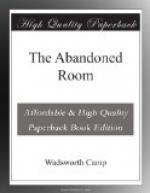Graham tiptoed forward. He stretched out his hand. With a motion of abhorrence he drew it back. Bobby watched him hypnotically, thinking:
“I wanted this. I hated him. I thought of it just before I went to sleep.”
Graham reached out again. This time he touched Howells’s head. It rolled over on the pillow.
“Good God!” he said.
They stared at the red hole, near the base of the brain, at a fresh crimson splotch, straying beyond the edges of the darker one they had seen that afternoon.
Graham turned away, his hand still outstretched, as if it had touched some poisonous thing and might retain a contamination.
“He was prepared against it,” he whispered, “expected it, yet it got him.”
He glanced rapidly around the room whose shadows seemed crowding about the candle to stifle it.
“Unless we’re all mad,” he cried, “the murderer must be hidden in this room now. Don’t you see? He’s got to be, or Groom’s right, and we’re fighting the dead. Go out, Katherine. Stand by that broken door, Bobby. I’m going to look.”
CHAPTER IV
A STRANGE LIGHT APPEARS AT THE DESERTED HOUSE
Graham’s intention, logical as it was, impressed Bobby as quite futile. Silas Blackburn had died in this ancient, melancholy room behind locked doors. This afternoon, with a repetition of the sounds that had probably accompanied his death, they had been drawn to find that, behind locked doors again, the position of the body had changed incredibly, as if to expose to them the tiny fatal wound at the base of the brain. Now for the third time those stealthy movements had aroused Katherine, and they had found, once more behind locked doors, the determined and malicious detective, murdered precisely as old Blackburn had been.
Of course Graham was logical. By every rational argument the murderer must still be in the room. Yet Bobby foresaw that, as always, no one would be found, that nothing would be unearthed to explain the succession of tragic mysteries. While Graham commenced his search, indeed, he continued to stare at the little round hole in Howells’s head, at the fresh, irregular stain on the pillow, and he became absorbed in his own predicament. Again and again he asked himself if he could be responsible for these murders which had been committed with an inhuman ingenuity. He knew only that he had wandered, unconscious, in the vicinity of the Cedars last night; that he had been asleep when his grandfather’s body had altered its position; that he had gone to sleep a little while ago too profoundly, brooding over Howells’s challenge to the murderer to invade the room of death and kill him if he could. Howells had been confident that he could handle a man and so solve the riddle of how the room had been entered. Certainly Howells’s challenge had been accepted, and Bobby knew that he had fallen into that deep sleep hating the detective, telling himself that the man’s death might save him from arrest, from conviction, from an intolerable walk to a little room with a single chair.




